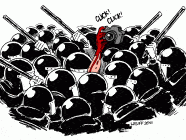Spiegel Online’s pre-election coverage last week was not wrong, yet somehow it missed the decisive point in its pull quote: “A clown, a billionaire, an apparatchik and a professor who understands nothing of politics: One of these men will become Italy’s new prime minister” . The real news, foreseeable before election day, is that two clowns will most probably render the country ungovernable. Together, the soap opera star and bunga bunga compère Berlusconi and the not-so-comical comic Beppe Grillo received more than 50 percent of votes.
Their success validates the analysis of two well-known communication researchers who’ve observed the developments in their country with sorrow long before this particular election. In a remarkable book, political scientist Gianpietro Mazzoleni described the absurd peculiarities of Italian “pop politics,” while for years semiotician Umberto Eco has cautioned that television is infantilizing Italians. Indeed, private and public television in Italy is of such lousy quality that stultifying long-term effects on the populace can hardly be avoided. Particularly as Italians are certainly not record-holding newspaper addicts, which means they don’t inform themselves adequately from more serious information sources.
The votes for Grillo and Berlusconi should also be seen as votes against Europe and as indication that Italians are increasingly losing touch with reality. Still, there remains a small sign of hope: Three times, Berlusconi failed to win a majority despite his the anthropic media power. He’s in direct control of the three largest private television stations in the country while indirectly controlling a large share of RAI, the state-owned public television broadcasting organization, as well the largest publishing company in the country, Mondadori. Even in Italy, the populism of “old” media seems to have its limits. The more sensational but hardly less populist success is Grillo’s as an organizer of mass assemblies combined with a unique online election campaign.
Originally published on Die Furche No. 9/2013
Tags: Beppe Grillo, Gianpietro Mazzoleni, Italian Journalism, Italian Television, Italy, Mediaset, Politics, Pop Politics, Rai, Silvio Berlusconi















































